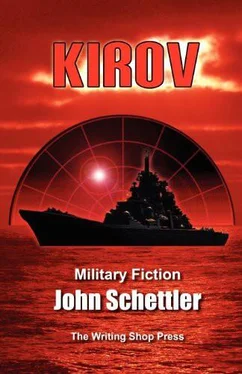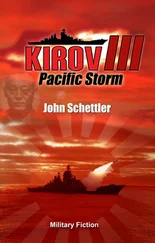John Schettler - Kirov
Здесь есть возможность читать онлайн «John Schettler - Kirov» весь текст электронной книги совершенно бесплатно (целиком полную версию без сокращений). В некоторых случаях можно слушать аудио, скачать через торрент в формате fb2 и присутствует краткое содержание. Жанр: Фантастика и фэнтези, Альтернативная история, на английском языке. Описание произведения, (предисловие) а так же отзывы посетителей доступны на портале библиотеки ЛибКат.
- Название:Kirov
- Автор:
- Жанр:
- Год:неизвестен
- ISBN:нет данных
- Рейтинг книги:5 / 5. Голосов: 1
-
Избранное:Добавить в избранное
- Отзывы:
-
Ваша оценка:
- 100
- 1
- 2
- 3
- 4
- 5
Kirov: краткое содержание, описание и аннотация
Предлагаем к чтению аннотацию, описание, краткое содержание или предисловие (зависит от того, что написал сам автор книги «Kirov»). Если вы не нашли необходимую информацию о книге — напишите в комментариях, мы постараемся отыскать её.
Kirov — читать онлайн бесплатно полную книгу (весь текст) целиком
Ниже представлен текст книги, разбитый по страницам. Система сохранения места последней прочитанной страницы, позволяет с удобством читать онлайн бесплатно книгу «Kirov», без необходимости каждый раз заново искать на чём Вы остановились. Поставьте закладку, и сможете в любой момент перейти на страницу, на которой закончили чтение.
Интервал:
Закладка:
Tennant scanned the horizon with his field glasses, then removed them, squinting up into the sallow gray sky to look for any sign of an aircraft. There was nothing. He was like a blindfolded boxer in a ring with the heavyweight champion of the world. He would never see the punches coming, nor the man who threw them, but he would surely feel them. He had taken two hard blows to the gut, and his ship was doubled over with the pain. Yet as he looked about him, rushing from one side of the bridge to another, the sea was stark, cold and empty.
Wake-Walker was brooding on the Bridge of HMS Victorious. He had been delayed while detaching his destroyer screen to Iceland for refueling and sorting out his remaining planes into one new squadron. The enemy put on more speed and slipped away, and his radar lost contact with the phantom raider. Wanting to get back in the chase, he had planes up that morning spread out in a line abreast in two sub-flights of three each. One of each group was equipped with radar. The other two were, he realized, nothing more than decoys. If the enemy fired those damnable long range rockets at them, chances are they might target the wrong plane and he could re-acquire his fix on the enemy contact to the south. The planes were having fits with their radar, however, and his flight leader reported he could see nothing at all. Reluctantly, he gave the order to bring the ship about, turning on a heading to best recover his fighters. HMS Furious was out in front, all her planes but two gone now. He would send her off to Scapa Flow in due course, but for now she was nothing more than a forlorn scout ship.
In fact, that had been her role when first laid down in 1915. She was one of three ‘oddball’ ships, a light battlecruiser with just two massive guns, one in each of two turrets mounted fore and aft. But she was soon to lose the cumbersome weapon up front and have it replaced with a seaplane flight deck that converted her to a hybrid cruiser-carrier. A year later the aft turret was removed for another seaplane deck there, and by 1925 both of these decks had been removed and replaced with a single flight deck that ran nearly the whole length of the ship. Two other old ships had undergone similar reconstructive surgery, the Courageous and Glorious, but the former was torpedoed and sunk by U-20 on 17 Sept 1939, and the latter sunk by gunfire from Scharnhorst and Gneisenau on 8 June 1940 during the evacuation of Norway. Furious was the last of the oddballs, a strange, anachronism from the First World War bridging the way to a new era. Yet she was fated that morning to be struck by a nemesis from a time no man aboard her could imagine, let alone comprehend.
Two Moskit-II Sunburns arced up into the sky and sped north, accelerating to lightning speed over the first 90 kilometers, then descending rapidly to skim just above the sea. They had each been targeted at one of the two British carriers but, for some reason, both now homed in on the lead contact, hapless and forsaken, the odd man out of the fleet, HMS Furious. Midshipman Bill Simpson saw them coming, just by chance when he was out on the flight deck that morning with Albert Gibson laying lines.
“Look there, Al,” he pointed, and the two men saw something blur silently in from the starboard quarter, impossibly fast, then turn with a suddenness that astounded them and flash in against the ship. There was a thunderous roar as the first missile struck, blasting through the thinner three inch side armor and flaming into the guts of the ship as its remaining fuel igniting in a holocaust of fire and smoke.
The delay off Iceland had seen the task force fall nearly 200 kilometers behind the enemy, and that ended up being a bit of a saving grace. The missiles had expended much of their liquid fuel before they hit home, and there was less to ignite the fires. Seconds later the other missile struck, literally reeling the ship to one side as it thundered home and sent both Simpson and Gibson sprawling onto the deck. Luckily, they were in the aft quarter of the ship, and when the second explosion blasted up through the thin flight deck, they were saved from the flying shrapnel, fire and debris. But Furious had been struck a heavy blow, immolating her vacant, empty forward hanger area, with chunks of twisted steel shot gunned clean through the other side of the ship. Fire and thick, black smoke were everywhere.
Aboard Victorious, Wake-Walker’s head was jerked around as he looked, aghast at the scene. He had been in the plot room a moment ago, and did not see the missiles approach. So he, like Captain Tennant on the Repulse, surmised that this had to be a torpedo attack or enemy air strike off the Graf Zeppelin, and he shouted the order for all hands to stand to battle stations. What was wrong with the ruddy radar sets today? There had been no sign of aircraft about at all. Then he noticed the strange contrails high in the distance, two thin tracks from the south aimed right at his ships.
Thirty kilometers behind Repulse, Admiral John Tovey knew exactly what Tennant was speaking of when he sent his frantic messages. King George V had been struck in exactly the same place, dead amidships, and just above the waterline, though thankfully on the thickest portion of her main belt armor, all of fifteen inches there, with newer cemented armor that was even more resistant to shock. While the missiles had managed to storm through the side armor of Repulse, Tovey’s newer ship was jarred, set afire by exploding fuel, but was otherwise unharmed. The shock, however, was more mental than physical. Both he and his bridge crew were astounded to think that the Germans could have a weapon of this speed and accuracy. There was no enemy ship anywhere in sight, and nothing whatsoever between his ship and Repulse, which meant that this rocket must have been fired from a range of over a hundred kilometers, many times the range of his big main 14 inch guns. In fact, it had been fired at a range of 130 kilometers, running that distance in just two and a half minutes.
Tovey’s mind reeled with the shock of the attack, unable to comprehend it. How could they even see his ship to know how to aim and fire such a weapon? He called to his air watch radar sets and yet no one had seen anything more than snowy static on their screens. No watchman had reported any sign of a spotting plane. Then, just as he was getting an assessment of the damage below, another rocket contrail could be seen overhead, swooping suddenly down to the ocean and skimming right in over the wave tops to shudder against the side of his battleship in another thunderous explosion.
The big ship rocked, then steadied herself, but there was more smoke and fire than actual serious damage. “God, almighty,” said Tovey. “Thank our lucky stars we’re taking these on the main belt armor.” His ship had been designed to take potential hits from the main guns of opposing battleships and survive intact to keep fighting. In fact, his sister ship Prince of Wales had been hit several times by large 15 inch shells fired by the Bismarck weighing all of 1760 pounds. While damaged and penetrated, the ship had remained seaworthy and was even now at sea ferrying the Prime Minister to Newfoundland.
By comparison, the missiles fired that morning from Kirov delivered a warhead weighing just under 1000 pounds. This alone was not sufficient to penetrate the battleship’s main armor when struck full on, though the kinetic power of the full missile itself when it struck, delivered an incredible shock that buckled the armor at the point of impact. Yet it held, the strongest outer wall of the citadel that was the armored shell around the ship’s most vital inner compartments.
In her first incarnation Kirov had carried an even bigger weapon, the P-700 Granit “Shipwreck” missile that delivered a warhead twice the size of the Sunburn on a missile that was nearly twice as heavy. These had been removed and replaced by lighter, faster weapons designed to defeat the real armor of a modern ship, which was its suite of electronic countermeasures and missile and gun defenses. The warheads on the new Sunburns would have been enough to make a shipwreck out of most modern destroyers or frigates with one or two hits, but they were now striking targets with heavier armor they had never been designed to defeat.
Читать дальшеИнтервал:
Закладка:
Похожие книги на «Kirov»
Представляем Вашему вниманию похожие книги на «Kirov» списком для выбора. Мы отобрали схожую по названию и смыслу литературу в надежде предоставить читателям больше вариантов отыскать новые, интересные, ещё непрочитанные произведения.
Обсуждение, отзывы о книге «Kirov» и просто собственные мнения читателей. Оставьте ваши комментарии, напишите, что Вы думаете о произведении, его смысле или главных героях. Укажите что конкретно понравилось, а что нет, и почему Вы так считаете.












